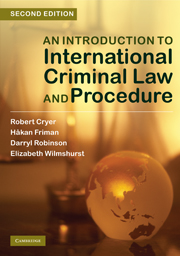Book contents
- Frontmatter
- Contents
- Preface to the Second Edition
- Table of Cases
- Table of Treaties and other International Instruments
- Table of Abbreviations
- PART A INTRODUCTION
- PART B PROSECUTIONS IN NATIONAL COURTS
- PART C INTERNATIONAL PROSECUTIONS
- PART D SUBSTANTIVE LAW OF INTERNATIONAL CRIMES
- PART E PRINCIPLES AND PROCEDURES OF INTERNATIONAL PROSECUTIONS
- PART F RELATIONSHIP BETWEEN NATIONAL AND INTERNATIONAL SYSTEMS
- 20 State Cooperation with the International Courts and Tribunals
- 21 Immunities
- 22 Alternatives and Complements to Criminal Prosecution
- 23 The Future of International Criminal Law
- Index
- References
22 - Alternatives and Complements to Criminal Prosecution
from PART F - RELATIONSHIP BETWEEN NATIONAL AND INTERNATIONAL SYSTEMS
Published online by Cambridge University Press: 05 June 2012
- Frontmatter
- Contents
- Preface to the Second Edition
- Table of Cases
- Table of Treaties and other International Instruments
- Table of Abbreviations
- PART A INTRODUCTION
- PART B PROSECUTIONS IN NATIONAL COURTS
- PART C INTERNATIONAL PROSECUTIONS
- PART D SUBSTANTIVE LAW OF INTERNATIONAL CRIMES
- PART E PRINCIPLES AND PROCEDURES OF INTERNATIONAL PROSECUTIONS
- PART F RELATIONSHIP BETWEEN NATIONAL AND INTERNATIONAL SYSTEMS
- 20 State Cooperation with the International Courts and Tribunals
- 21 Immunities
- 22 Alternatives and Complements to Criminal Prosecution
- 23 The Future of International Criminal Law
- Index
- References
Summary
Introduction
It is probably fair to say that most international criminal lawyers have an expressed or unexpressed preference for criminal prosecutions as the default response to the commission of international crimes. It is also the case that there has been a swing away from the ‘politics of impunity’ in international law. However, many people hold out greater goals for international criminal justice than prosecutions for their own sake, and as was seen in Chapter 2, there is truth in the proposition that ‘[c]riminal prosecution … does some things rather well, other things only passably well, and makes an utter hash of still others’. Thus it is unsurprising that there have been other models suggested for dealing with international crimes, on the basis that they are said to fulfil more completely at least some of the purposes of trials, and incur fewer of the problems. Not all of them are mutually exclusive. This chapter will provide an overview of them, alongside some of their positive and negative features.
None of the mechanisms discussed in this chapter are in and of themselves perfect. Each has ‘incompleteness and inescapable inadequacy’ as a response to international crimes. Just because other mechanisms perform certain roles in a fashion that prosecutions cannot, does not mean that they are necessarily the most appropriate response to international crimes in any particular situation.
- Type
- Chapter
- Information
- An Introduction to International Criminal Law and Procedure , pp. 561 - 578Publisher: Cambridge University PressPrint publication year: 2010



